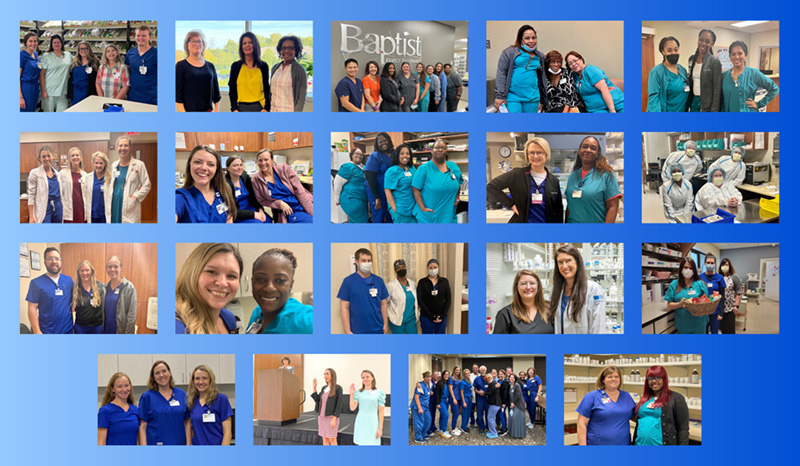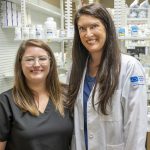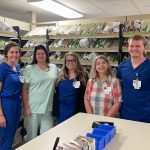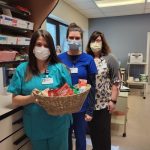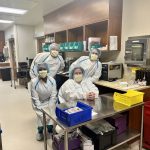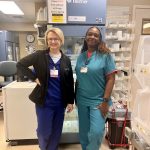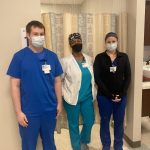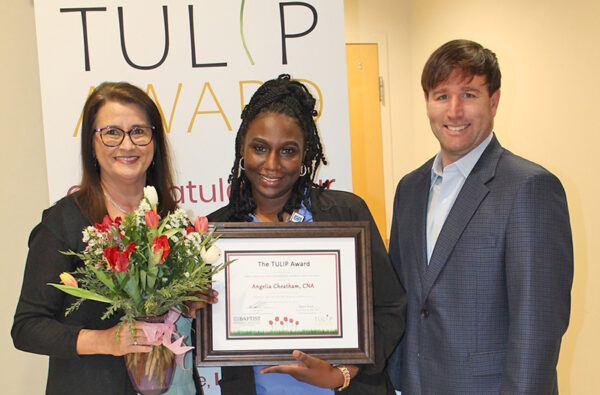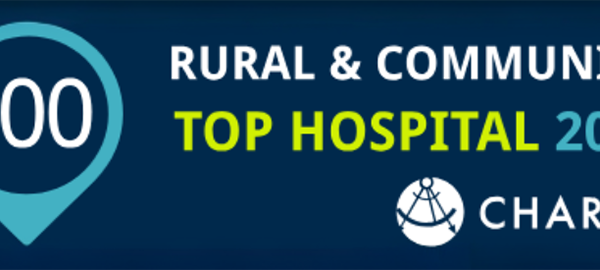We’re so proud of our pharmacy teams across the Baptist system for everything they do to provide the best care for our patients. National Pharmacy Week, October 16–22, 2022, acknowledges the invaluable contributions that pharmacists and pharmacy technicians make to patient care. For us at Baptist, that care is delivered by the pharmacy teams in our hospitals, our outpatient pharmacies, in Baptist Medical Group clinics and in our infusion centers. We also have a home infusion pharmacy called Medical Alternatives, a mail order pharmacy and a specialty pharmacy. We even have pharmacists and technicians at Corporate on the Baptist OneCare team, in supply chain, and on our 340B team.
 We talked with Jillian Foster, pharmacy administrator for Baptist Memorial Health Care, to help us highlight the important contributions our pharmacists and pharmacy technicians make at Baptist.
We talked with Jillian Foster, pharmacy administrator for Baptist Memorial Health Care, to help us highlight the important contributions our pharmacists and pharmacy technicians make at Baptist.
What are some of the ways pharmacists and technicians contribute to patient care?
We are pleased and fortunate to have pharmacy woven throughout so many aspects of our organization. The pharmacy teams across our system are very well known for being problem solvers. Many of our pharmacy leaders and pharmacy team members use the Baptist Management System to help with patient flow, patient care and medication delivery. They’ve reached out to work together with nurses, providers and all other departments to find solutions, especially during the pandemic.
COVID-19 has been a real test of endurance. For pharmacy teams across the country, certainly the pharmacy teams at Baptist, the pandemic gave them an opportunity to prove their ability to be very creative with resources while keeping patient care and safety front of mind.
We also have many pharmacists and technicians who are certified in a particular specialty, not because it’s required, but because they are motivated to go that extra step so they can provide the very best patient care. Baptist has numerous pharmacists who are board certified in oncology, as well as some who are board certified in infectious diseases, pharmacotherapy and other areas. We also have many technicians who are certified, and we’re continuing to support and promote that.
How do hospital pharmacies differ from outpatient pharmacies, and what can you tell us about Baptist outpatient pharmacies?
Baptist is historically known for our strong acute care hospital pharmacies, but we also have many outpatient pharmacies. We have pharmacies in the hospital lobby, while others are across the street from the hospital, or in a Baptist Medical Group clinic.
For hospital pharmacy, your patient is not mobile, and the timing of the medications and the therapeutic indication for the medications is different. You’re treating a patient with an acute condition, so you’re preparing sterile intravenous products sometimes.
Outpatient pharmacy involves more medications for chronic conditions. So, your drug information knowledge is different. Your patients are mobile, and you may interface with them more.
Many of our hospital pharmacists are decentralized and interact with patients upon admission, during their stay and at discharge. So more and more, I feel like the lines of outpatient pharmacy and hospital pharmacy are crossing over. The transition of care from the hospital to the outpatient setting is very important. That’s why Baptist developed outpatient pharmacy services.
We also fill prescriptions for Baptist team members, and we would love for more to take advantage of that. It’s convenient. Most of our outpatient pharmacies are located near the front of the building or as you enter or exit the building. Many of our outpatient pharmacies are on MyChart and offer mail order pharmacy for convenience. Sometimes the Baptist pharmacy copay may be the lowest copay that an individual could pay.
What does a specialty pharmacy do that’s different?
Our specialty pharmacy is centrally located in Memphis and services patients across our Baptist footprint by shipping their medications to them.
A specialty pharmacy is often involved with a medication that’s more complex. It may have special requirements for handling like refrigeration. There may be the need for more education on how to administer the specialty medication that may be oral or injectable. The pharmacist-patient relationship may require more time and be more detailed about side effects or financial assistance.
What would you say to someone thinking about a career in pharmacy?
Pharmacy is a great career that never gets old. It’s ever-changing, and there are so many different options for a pharmacist or a pharmacy technician. Pharmacy is now in almost in every care setting – in the home, in outpatient and inpatient. It’s very rewarding.
Several of our Baptist locations offer a pharmacy residency program that provides exposure to health system pharmacy and can be helpful with choosing an area to focus on as a pharmacist.
Is there anything you’d like to add?
I want to end with highlighting the caliber of our pharmacy teams. They are very humble, and many may not know the talent that is in our organization. Many of our pharmacists across the system publish in reputable, peer-reviewed journals and are involved in national speaking engagements. For years, our pharmacists have served as leaders in many state pharmacy associations, and they’re still serving now. Baptist pharmacists and technicians have also been recognized with state and national awards.
In addition to external service and recognition, the Baptist pharmacists and technicians are recognized by their peers. Baptist has the Interdepartmental Services Survey three times a year, and it is impressive to see the pharmacy team members’ scores. For years, the pharmacy team across the system has scored 96% positive or higher. We are very fortunate to work in an organization that promotes service above self, and our pharmacy teams are living that out!

